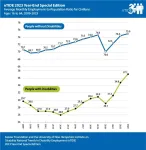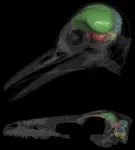(Press-News.org) Poison ivy ranks among the most medically problematic plants. Up to 50 million people worldwide suffer annually from rashes caused by contact with the plant, a climbing, woody vine native to the United States, Canada, Mexico, Bermuda, the Western Bahamas and several areas in Asia.
It’s found on farms, in woods, landscapes, fields, hiking trails and other open spaces. So, if you go to those places, you’re susceptible to irritation caused by poison ivy, which can lead to reactions that require medical attention. Worse, most people don’t know poison ivy when they see it.
To find poison ivy before it finds you, University of Florida scientists published a new study in which they use artificial intelligence to confirm that an app can identify poison ivy.
Nathan Boyd, a professor of horticultural sciences at the UF/IFAS Gulf Coast Research and Education Center near Tampa, led the research. Renato Herrig, a post-doctoral researcher in Boyd’s lab, designed the app.
“We were the first to do this, and it was designed as a tool for hikers or others working outdoors,” Boyd said. “The app uses a camera to identify in real-time if poison ivy is present and provides you with a measure of certainty for the detection. It also functions even if you don’t have connectivity to the internet.”
The next step is to make the app commercially available, and there’s no timetable for that yet, Boyd said.
For the study, researchers collected thousands of images of poison ivy from five locations: Alderman’s Ford Conservation Park and Hillsborough River State Park, both in Florida; Eufala National Wildlife Refuge in Alabama; York River State Park in Virgina and Fall Creek Falls State Park in Tennessee.
They labeled images, and in each image, scientists put boxes around the leaves and stems of the plant. The boxed images were critical because poison ivy has a unique leaf arrangement and shape. Scientists use those characteristics to identify the plant.
They then ran the images through AI programs and taught a computer to recognize which plants are poison ivy. They also included images of plants that are not poison ivy or plants that look like poison ivy to be certain the computer learns to distinguish them.
“We believe that by integrating an object-detection algorithm, public health and plant science, our research can encourage and support further investigations to understand poison ivy distribution and minimize health concerns,” Boyd said. In their future work UF/IFAS researchers hope to expand the use of the app to identify more noxious plants.
END
AI-powered app can detect poison ivy
2024-01-31
ELSE PRESS RELEASES FROM THIS DATE:
Up to three daily servings of kimchi may lower men’s obesity risk
2024-01-31
Eating up to three daily servings of the Korean classic, kimchi, may lower men’s overall risk of obesity, while radish kimchi is linked to a lower prevalence of midriff bulge in both sexes, finds research published in the open access journal BMJ Open.
Kimchi is made by salting and fermenting vegetables with various flavourings and seasonings, such as onion, garlic, and fish sauce.
Cabbage and radish are usually the main vegetables used in kimchi, which contains few calories and is rich in dietary fibre, microbiome enhancing lactic acid bacteria, vitamins, and polyphenols.
Previously published experimental studies ...
Increase in annual cardiorespiratory fitness by 3%+ linked to 35% lower prostate cancer risk
2024-01-31
An increase in annual cardiorespiratory fitness by 3% or more is linked to a 35% lower risk of developing, although not dying from, prostate cancer, suggests research published online in the British Journal of Sports Medicine.
The findings prompt the researchers to conclude that men should be encouraged to improve their level of fitness to help lower their chances of getting the disease.
There are relatively few known risk factors for prostate cancer, note the researchers. And while there’s good evidence for the beneficial effects of physical activity on ...
High quality diet in early life may curb subsequent inflammatory bowel disease risk
2024-01-31
A high quality diet at the age of 1 may curb the subsequent risk of inflammatory bowel disease, suggests a large long term study, published online in the journal Gut.
Plenty of fish and vegetables and minimal consumption of sugar-sweetened drinks at this age may be key to protection, the findings indicate.
A linked editorial suggests that it may now be time for doctors to recommend a ‘preventive’ diet for infants, given the mounting evidence indicative of biological plausibility.
Cases of inflammatory bowel disease (IBD), which includes Crohn’s disease and ulcerative colitis, are increasing globally. Although there is no obvious ...
Next government should declare a national health and care emergency
2024-01-31
The government in post after the election should declare a national health and care emergency, calling on all parts of society to help improve health, care, and wellbeing, say experts in the first report of The BMJ Commission on the Future of the NHS.
The new government should, in effect, relaunch the NHS with a renewed long term vision and plan, they argue.
"The NHS has never seemed so embattled—and its core principle of ‘free to all at the point of use’ has never been so under threat,” said Kamran ...
Unprecedented success continues: 2023 employment gains for people with disabilities outshine those of counterparts without disabilities
2024-01-31
East Hanover, NJ – January 30, 2024 – Amidst the backdrop of a remarkable four-year streak of growth, the employment indicators for people with disabilities reached unprecedented milestones in 2023. This achievement stands in stark contrast to the experiences of people without disabilities who faced a more severe decline during the COVID-19 pandemic and a slower recovery, not surpassing their pre-pandemic employment levels until 2023. That’s according to the National Trends in Disability Employment (nTIDE) 2023 Year-End Special Edition, ...
Scientists pinpoint growth of brain’s cerebellum as key to evolution of bird flight
2024-01-31
**EMBARGOED UNTIL 7:01 P.M. ET TUESDAY, JAN 30**
Evolutionary biologists at Johns Hopkins Medicine report they have combined PET scans of modern pigeons along with studies of dinosaur fossils to help answer an enduring question in biology: How did the brains of birds evolve to enable them to fly?
The answer, they say, appears to be an adaptive increase in the size of the cerebellum in some fossil vertebrates. The cerebellum is a brain region responsible for movement and motor control.
The research findings are published in the Jan. 31 issue of the Proceedings of the Royal Society B.
Scientists have long thought that the cerebellum should be important ...
Machine learning informs a new tool to guide treatment for acute decompensated heart failure
2024-01-30
A recent study co-authored by Dr. Matthew Segar, a third-year cardiovascular disease fellow at The Texas Heart Institute and led by his research and residency mentor, University of Texas Southwestern Medical Center’s Dr. Ambarish Pandey, utilized a machine learning-based approach to identify, understand, and predict diuretic responsiveness in patients with acute decompensated heart failure (ADHF).
The study “A Phenomapping Tool and Clinical Score to Identify Low Diuretic Efficiency in Acute Decompensated ...
Clear legal rules about the use of sperm and eggs in fertility treatment must remain to protect the vulnerable, study says
2024-01-30
Clear legal rules outlining the use of the sperm and eggs of those who are incapacitated must remain in place to protect the vulnerable from being involved in fertility treatment without their consent, a new study says.
There are strict laws in England and Wales involving the use of reproductive materials, but the research outlines how recent court cases have weakened this existing rigorous consent regime.
It warns this could create a common law exception to informed consent, leaving the current law in a delicate position. The research says it is “not outside the realms of possibility” that some people may try to take ...
New interview with Eric Topol, MD, on the state of artificial intelligence in precision oncology
2024-01-30
An interview with Eric J. Topol, MD, a world-renowned cardiologist, best-selling author of several books on personalized medicine, and the founder and director of the Scripps Research Translational Institute in La Jolla, California, has been published. in the new peer-reviewed journal, AI in Precision Oncology. Dr. Topol is an advocate for using digital technologies and artificial intelligence in health care. click here to read the interview now.
Douglas Flora, MD, Editor-in-Chief of AI in Precision Oncology, interviewed Dr. ...
Rotman School Professor named to Thinkers50 Radar Class
2024-01-30
Rotman School Professor Named to Thinkers50 Radar Class
Toronto – Maja Djikic, an associate professor of organizational behaviour and human resource management at the University of Toronto’s Rotman School of Management, has been named to the Thinkers50 Radar class for 2024.
Announced every January, the Thinkers50 Radar identifies a cohort of 30 up-and-coming thinkers from around the world whose ideas have the potential to make an important impact on management thinking in the future.
A personality psychologist specializing in adult development, Prof. Djikic is executive director of the Self-Development Lab at the Rotman School, which provides ...







